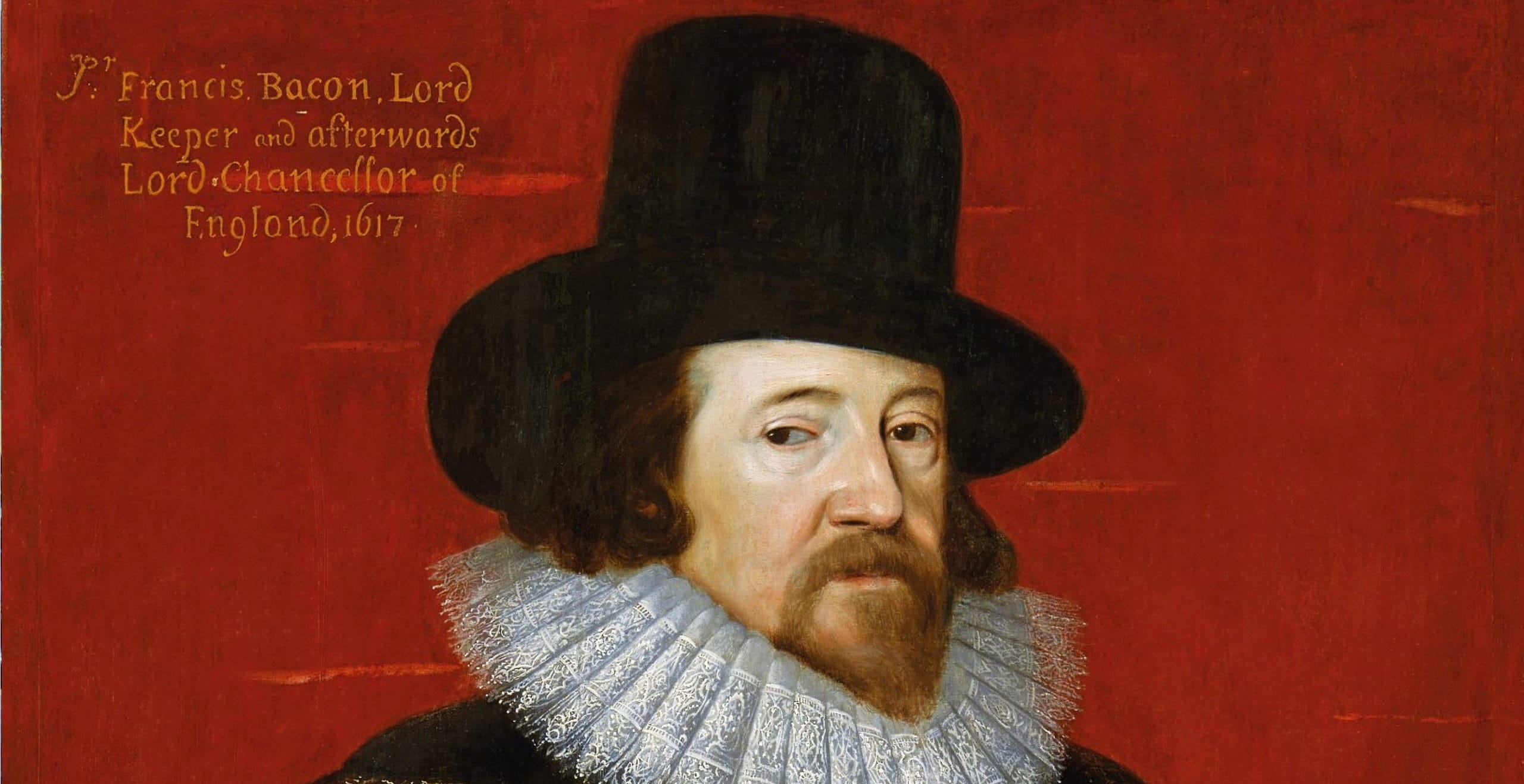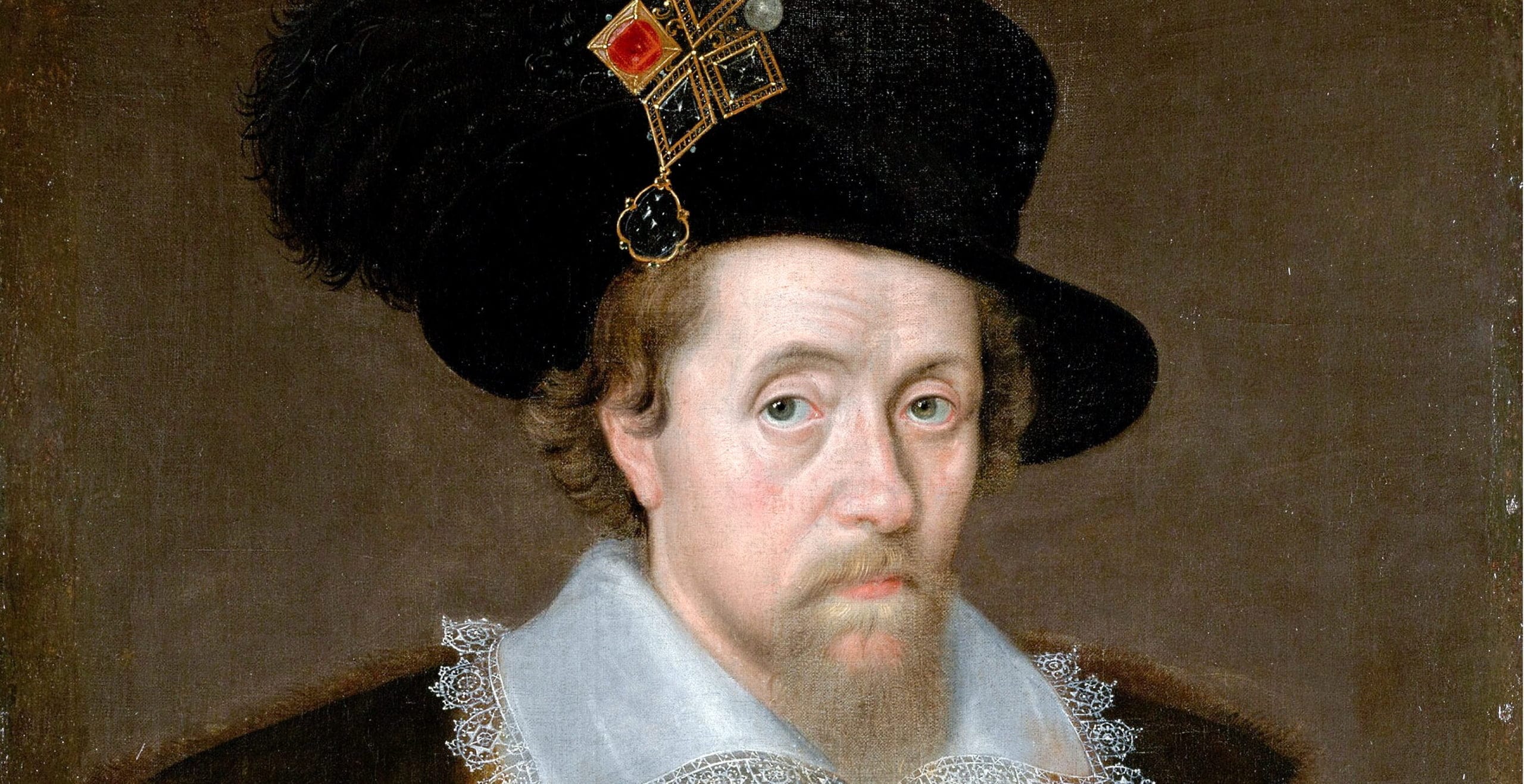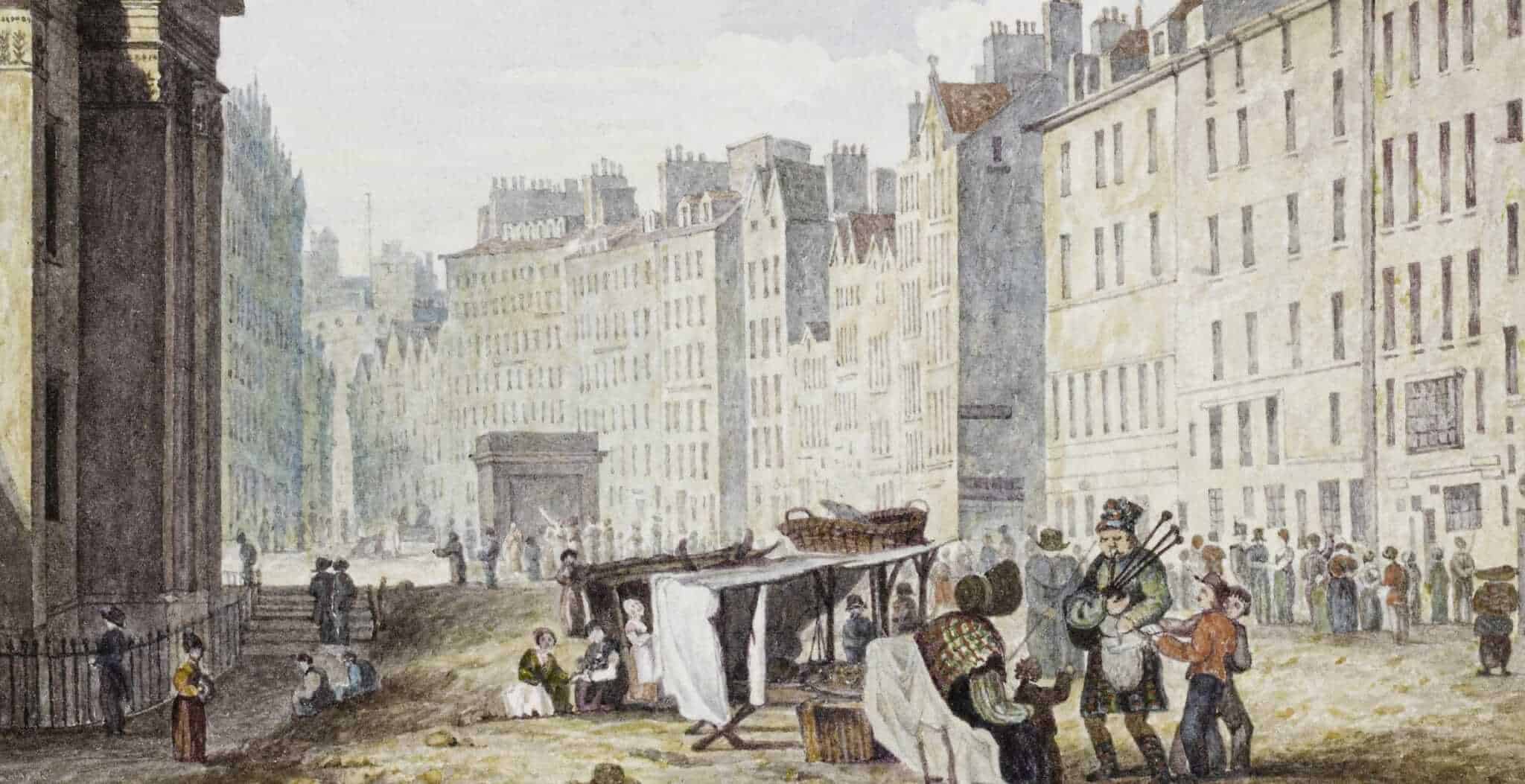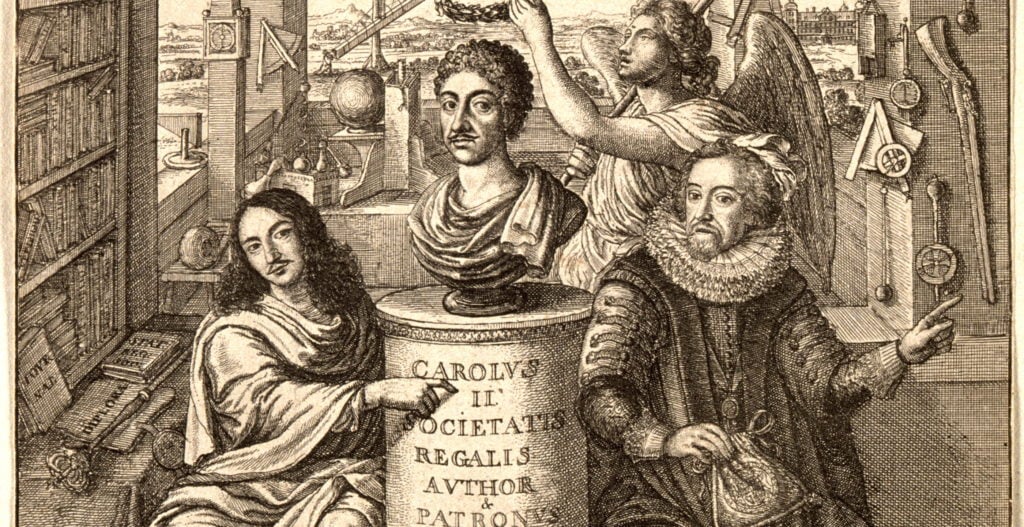Born on 22nd January 1561, Francis Bacon was an influential figure: philosopher, parliamentarian and pioneer in scientific methodology.
In his lifetime he served in high-ranking positions both as Attorney General and as Lord Chancellor, whilst he also held a more unofficial title thanks to his work in science earning him the epithet, “father of empiricism”.
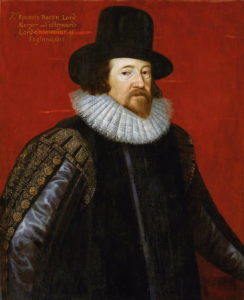
Francis Bacon’s impressive credentials were rooted in his good education and important family connections as his father was Sir Nicholas Bacon who held the position of Lord Keeper of the Great Seal.
This was a position that Francis himself would hold, a notable position that was adopted in the time of Edward the Confessor.
His mother was the daughter of an important English scholar of humanism who also acted as tutor to Edward VI. She was a devoutly religious individual and served as Lady-in-Waiting to Queen Elizabeth.
The important family connections extended also to his aunt, his mother’s sister, who was the wife of William Cecil, 1st Baron of Burghley. These valuable networks would thus provide an important springboard for the budding young scholar’s future career.
Young Francis Bacon received a medieval curriculum, steeped in Latin. He benefited from tuition given by the future Archbishop of Canterbury, Dr John Whitgift. At the tender age of twelve he was attending Trinity College, Cambridge, living with his brother, Anthony.
Whilst he was at Cambridge University he had his first royal encounter when he met Queen Elizabeth I and apparently left a lasting impression on her, as she was said to have often referred to him as “the young lord keeper”, in reference to his eloquent manner which was advanced beyond his years.
At this time his studies allowed him to develop strong opinions about scientific methodology as well as philosophy, interests which he would carry for the rest of his life.
In June 1576, he and his brother entered Gray’s Inn although Francis preference for humanism over Aristotelianism proved somewhat of a barrier. Instead, he left the school to travel to the continent with the English ambassador, Sir Amias Paulet in Paris whilst his brother remained at home.
For the next few years, young Francis travelled extensively, visiting numerous locations in France as well as Italy and Spain, affording the precocious young man a wealth opportunities and an exposure to politics, society and law which he might not have experienced had he stayed at home.
He was part of the diplomatic circle and was said to have delivered letters to important individuals including Walsingham as well as the Queen.
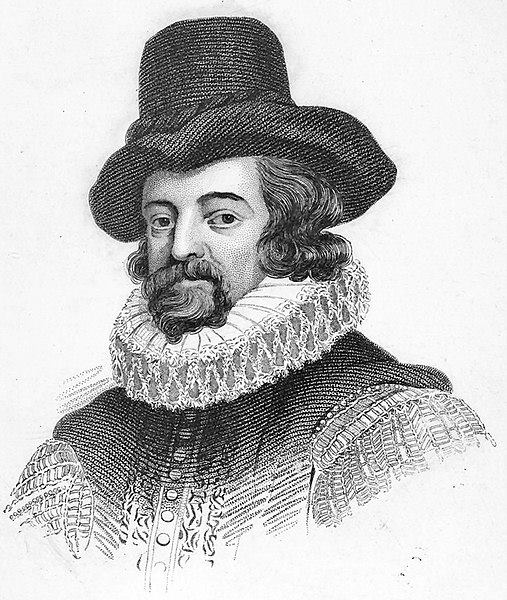
Sadly for Francis, he experienced a personal tragedy which forced his return home when his father died in 1579. To make matters worse, young Francis quickly fell into debt after a transaction instigated by his father before his death was not followed through. This left Francis to pursue a legal career at Gray’s Inn in order to pay his debts.
In 1582 he was accepted as an outer barrister, however it was his entry into politics that would become the focal point for Bacon for the remainder of his life.
Beginning in 1584 with his own political memorandum entitled, “A Letter of Advice to Queen Elizabeth”, his breakthrough into the world of politics would allow him a four decade long career.
Beginning with his success at the by-election in Bossiney, Cornwall, three years later he would take his seat as an MP for Melcombe in Dorset, followed by Taunton.
Now serving in the capacity of public duty, Bacon made clear his aims which consisted of serving his country, revealing the truth and serving the Church. During his political career he would earn a reputation as a reformer, a man who despite his close personal ties to the monarchy was against feudal privileges and spoke out about the issues he was most passionate about.
This included showing a great interest in religion, so much so that he started to write about the condition of church parties and philosophical reform. His leanings towards the beliefs and practices of Puritanism, as inspired by his mother, led him to publish one of his earliest works on the English church’s oppression of the Puritan clergy. He also showed his support of Puritanism in the House of Commons when in 1586 he advised and insisted on the execution of Mary, Queen of Scots, who was a renowned figure of the Catholic Church.
He also spoke out openly against forms of religious persecution and also addressed what he believed was the unjust feudal privileges and the abusive dictatorial powers in the law.
During his political career, Francis Bacon made a lasting impression. He was a keen supporter of the union between England and Scotland and later he advocated the inclusion of Ireland into the union as he believed it would lead to more peaceful conditions in these countries. He was therefore a pioneering figure in the creation of the United Kingdom.
Whilst he was a proactive liberal-minded politician, unafraid to speak his mind in the House of Commons, his popularity with Queen Elizabeth I was not particularly high although he did serve in an advisory legal capacity.
Nonetheless, when James I ascended the throne in 1603, Francis Bacon received a real and very noticeable upsurge in his career prospects.
So much so, that in the same year as James I became reigning monarch, Bacon received a knighthood and in the coming years looked set to receive a great deal of important posts.
He won the trust of the king and went on to serve as Solicitor General in 1607, followed by Attorney General and then later marking a significant landmark as part of the Privy Council.
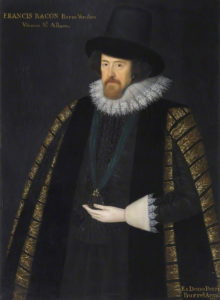
Perhaps most notably for its personal resonance, he followed in his father’s footsteps when he was appointed as Keeper of the Great Seal and in 1618 achieved dizzying heights of success when the king appointed him Baron Verulam and Lord Chancellor. This was one of the most prestigious titles one could have at the time. In 1621 he also received the title of Viscount St Alban.
During his political career he acted as an intermediary between the king and parliament, a pivotal role in seemingly tense times between parliament and James I. The issue of the king’s evident extravagance made relations between the two parties strained, however Bacon managed to maintain positive relations with both.
Nevertheless, his success was short lived as his accumulation of debt lead him to being charged on twenty-three counts of corruption. His demise had been largely orchestrated by Sir Edward Coke, a known opponent of Bacon.
For his involvement Bacon was to be fined, incarcerated and rejected from court. Despite being in the favour of the king and receiving his pardon, this was destined to be an embarrassing end to what had been a successful political career.
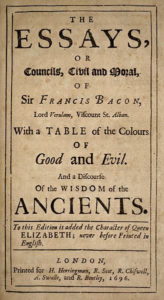
Bacon retired to his estate in Hertfordshire and chose to use this time to concentrate on writing. This proved to be very successful for him and in 1625 he produced his book “Essays” containing fifty-eight essays discussing a wide variety of issues drawn from both his personal and public life.
His literary career is notable for its effect on philosophy and also for coining phrases. His success in literature has even lead some to question whether he was responsible for some of Shakespeare’s work, a debate which continues to this day.
Bacon had many interests, with literature, philosophy, science and general academia ranking very high in his list of priorities.
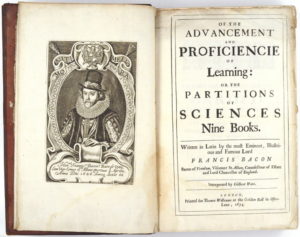
His interests also coincided at a time where the Scientific Revolution looked to be progressing and developing, a process which would continue for several decades and would involve a great array of key characters, including Francis Bacon.
During his lifetime he argued emphatically that scientific information should be based on reasoning and observations, therefore if scientists adopted a methodical approach they could avoid pitfalls.
The evolution of a scientific approach based on a new standard of reason became known as the Baconian method, essentially referring to the use of inductive reasoning based on observation.
His ideas were outlined in his text “Novum Organum”, published in 1620, which, along with other works set the standard for a new scientific approach.
The process of reasoning challenged the accepted norms of Aristotelian ideas whereby the truth would be reached through persuasive arguments. Moreover, observations and logic would produce data that could be researched further and then subsequently produce a conclusion. This methodology had a huge influence on scientists and philosophers alike, such as the physician Thomas Browne and John Stuart Mill who later built on Bacon’s scientific method.
This was a great period of change, of which Bacon formed an important piece of the puzzle, pioneering curiosity, debate and a fresh approach to science which would continue to change, evolve and develop in the coming centuries. For this reason, it is unsurprising that his work inspired the namesake, “father of empiricism”.
An influential man with a wide-ranging career, Bacon passed away in April 1626, leaving behind no heirs. Instead, he left behind an impressive curriculum vitae, as a pioneer in parliament, scientific methodology, philosophy and close confidant of the monarchy.
Jessica Brain is a freelance writer specialising in history. Based in Kent and a lover of all things historical.
Published: 1st January 2022
